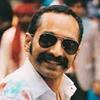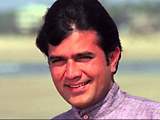The Slow Slipping Away Of Rajesh Khanna, Bollywood's First Superstar

It was raining when the family announced Rajesh Khanna's death on the afternoon of 18 July, 2012. Not the kind of heavy downpour that Mumbai's shrinking lakes would gratefully accept, but a light, continuous drizzle that swept Carter Road in Bandra West and dropped silently on Aashirwad -- the road and bungalow in which Rajesh Khanna lived, as if the Heavens were crying inconsolably for the loss of this great actor, Bollywood's first superstar.
When he joined film in the late 1960s, there were already romantic leading men and icons of the screen; certainly Dilip Kumar, Raj Kapoor and Dev Anand were legends, and there were also Dharmendra, Shammi Kapoor and Manoj Kumar, but none of them could claim to take their fame to the dizzying heights that Rajesh Khanna did. And he did it with what? A rosy complexion; twinkling eyes; a mischievous smile; clothes that were fashionably Indian and that he carried stylishly on his short, somewhat portly frame; a sense of dancing that was as ridiculous as it was endearing; and, a melodramatic style of acting that involved a lot of shaking of the head, prancing around and sidelong glances that would not have got past either the box-office or front-benchers today.
It was not his songs that made him Bollywood's first superstar, nor the 180 films... but his crazy fan following.
Yet he got away with it then -- and how! Quickly Rajesh Khanna amassed the biggest, maddest fan following across all of India with a string of Bollywood hits likeAradhna, Do Raaste, Anand, Itefaq, Daag, Saccha Jhutha, Aan Milo Sajana, Safar, Kati Patang, Andaz, Hathi Mera Saathi, Dushman, Amar Prem, Roti, Aap Ki Kasamand Prem Kahani. In this, he was aided by the wild, mellifluous and talented Kishore Kumar -- together they had recorded and filmed some of Bollywood's most memorable songs that stand the test of time even today. Rajesh Khanna himself was to say, "Kishore was the soul, I was the body" of their inseparable jodi of the 1960s and 70s. But it was not his songs that made him Bollywood's first superstar, nor the 180 films -- 106 of them as solo lead, because this was before the multi-star era -- but his crazy fan following. India had never seen anything like it. If boys in college dressed like him and wore their hair like he did, then girls wrote letters in blood swearing their undying love; they secretly got married to his photograph, and kissed his car to leave their lipstick prints behind.
And just when he was riding the crest of this huge and mad wave of fame and fortune -- Amitabh Bachchan had yet to step into the shoes of the angry young man -- Rajesh Khanna went and got married to the debutante actress Dimple Kapadia whom Raj Kapoor was introducing in Bobby. Bollywood had expected Rajesh Khanna to settle down with the vivacious fashion designer and actress Anju Mahendru, whom he dated for years, or perhaps even the lovely Mumtaz, with whom he shared several hits and supposedly also a romance. But no, it was the unknown Dimple Kapadia who became Mrs. Rajesh Khanna to the superstar and "Bobby" to Bollywood. Despite her own mercurial rise to fame with just one film, Dimple stayed away from the screen after that because Rajesh Khanna wanted a mother to raise his daughters and not some servant. Apologetically, he was to say later of his denying Dimple her career, "I had no idea of Dimple's talents, becauseBobby had not yet released when we got married, but I agree -- to curb talent is a crime."
Maybe it was the baggage he carried around of being a superstar, maybe it was the coterie of chamchas who lived his life with him -- there was no telling then of what went wrong -- but Rajesh Khanna and Dimple Kapadia soon split, and from then on the superstar's decline set in. There were other women who stepped inside Aashirwad, among them the actress Tina Munim whom Dev Anand had introduced, but a coldness had gripped his life and taken from it the sheer joy of living that he epitomized till the mid-70s. His popularity waned, his films quite simply got embarrassing, and by the 1980s Rajesh Khanna lost his grip on Bollywood and became a recluse who seldom stepped outside Aashirwad.
It was Rajiv Gandhi and the Congress who drew him out with the lure of politics closer to the 1990s, and Rajesh Khanna -- perhaps missing the adulation of fans and the contact with the masses -- agreed to contest elections and become a Member of Parliament from Delhi. At the time, he had said, "If India has 2,000 problems and I can solve even one, then I will feel I have achieved something." But it was not to be. Which Bollywood actor has ever made a success out of politics! And Rajesh Khanna was to regretfully say later, "When an actor neglects family, wife and kids because he is busy playing the star, how will he do justice to politics which requires 100% time and dedication."
Rajesh Khanna was to regretfully say, "When an actor neglects family, wife and kids because he is busy playing the star, how will he do justice to politics...?
His last years went by rapidly. If he lived in black and white flashback thinking of how he made Amitabh Bachchan's dream come true by doing Anand with him for Hrishikesh Mukherjee, then there was also a colourful spotlight coming down on Rajesh Khanna when IIFA conferred the Lifetime Achievement Award on him in 2009 and gave Amitabh Bachchan the honor of presenting him this trophy. Yes, it is true that it was Rajesh Khanna who inspired Amitabh Bachchan to join films when the latter was still a shipping company executive working in Calcutta. Of their earlier association that went from Anand to Namak Haram, the Big B was to handsomely say, "What hysteria Rajesh Khanna invoked... I used to be constantly asked, 'How does he look?' and 'What does he do?'" While Rajesh Khanna himself was to say of the yet-to-be-angry-young-man, "When I saw Amitabh Bachchan in Namak Haram, I knew my time was up."
But his time was not really up until that rainy afternoon in Mumbai. When tired of battling ill-health, perhaps depressed of being alone for half his life, and fatigued by the demands made by a curious and capricious industry to try and get him back to stardom like others of his time were doing... Rajesh Khanna quietly slipped away in the comfort and security of Aashirwad with his family around him. He went like "Anand" did of cancer in the 1972 film that fetched him the Best Actor Award. Among those with India's first superstar when he breathed his last was his son-in-law and current Bollywood superstar Akshay Kumar, to whom Rajesh Khanna once advised, "Dance, entertain, do good action... but act only in films that have a purpose, not this Khiladi series."
Sadly, for this dialogue, and for his quiet and dignified farewell to cinema and life, Rajesh Khanna did not get any awards. Kaka was Bollywood's term of affection for him, because in Punjabi it means a small baby, and when he joined films he was a baby. But he earned the industry's respect, and they added the 'ji' later to immortalize him forever as Kakaji -- the first superstar of Hindi cinema.












comment:
p_commentcount